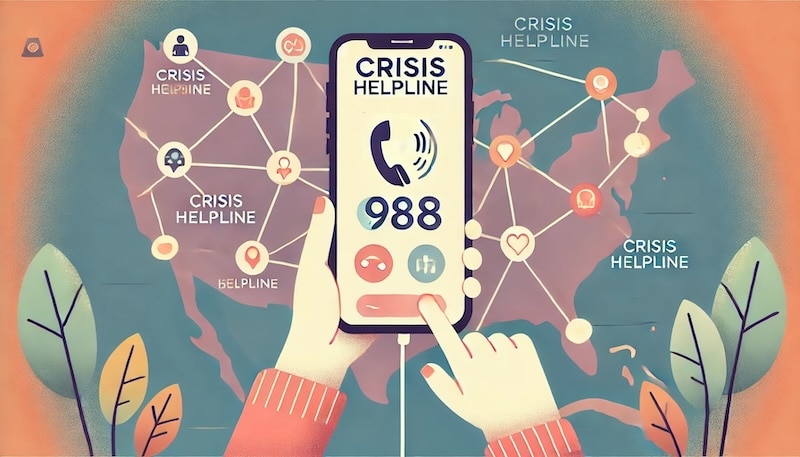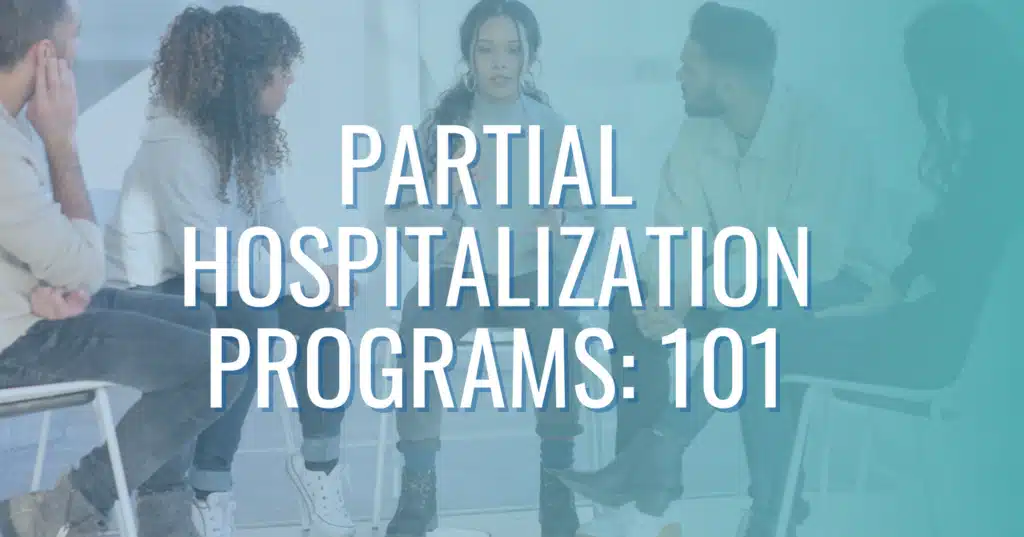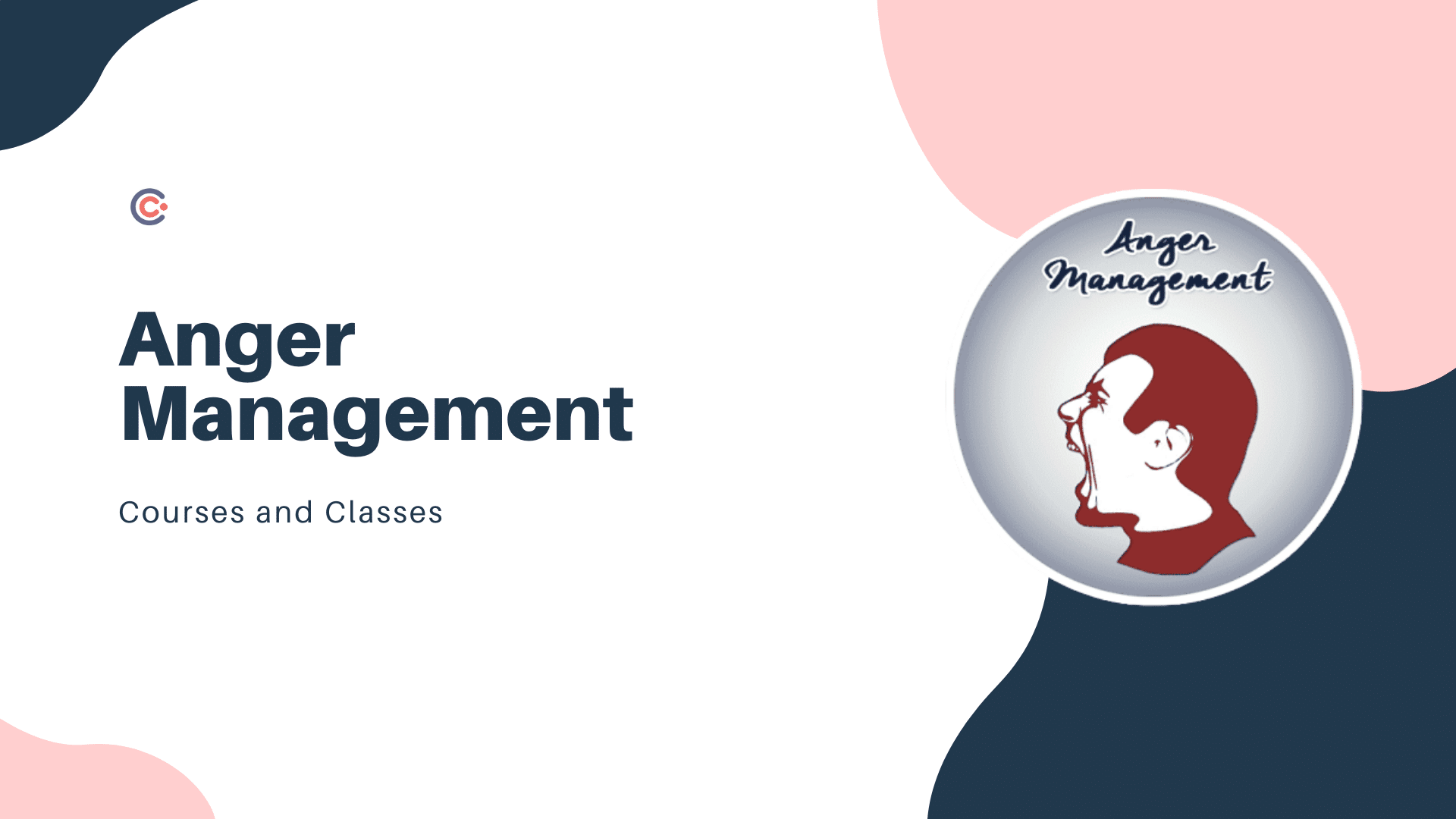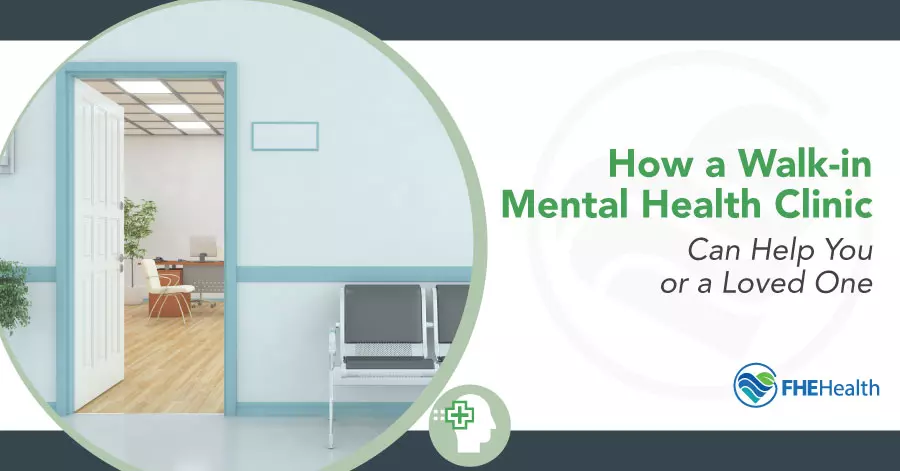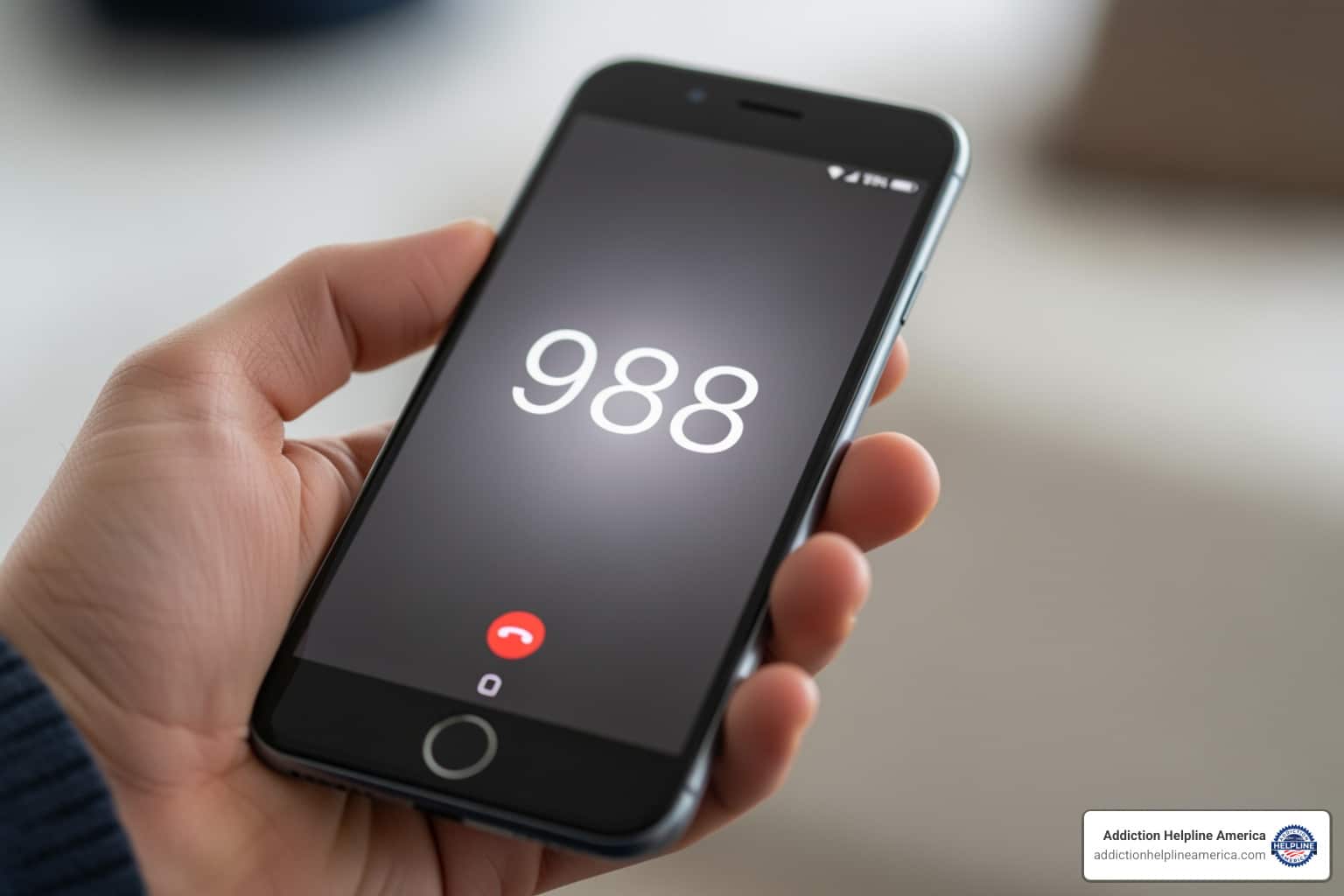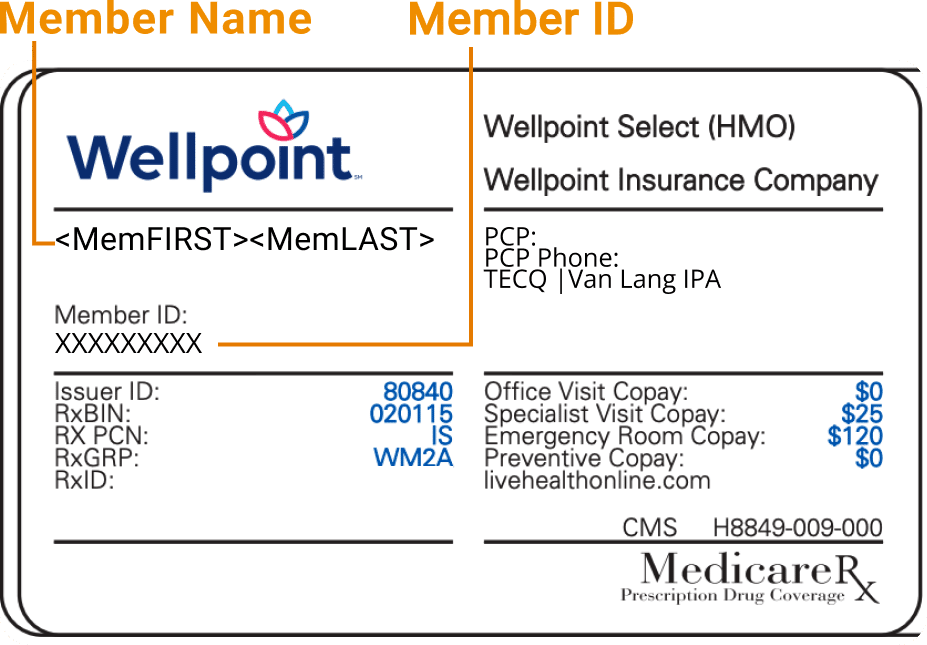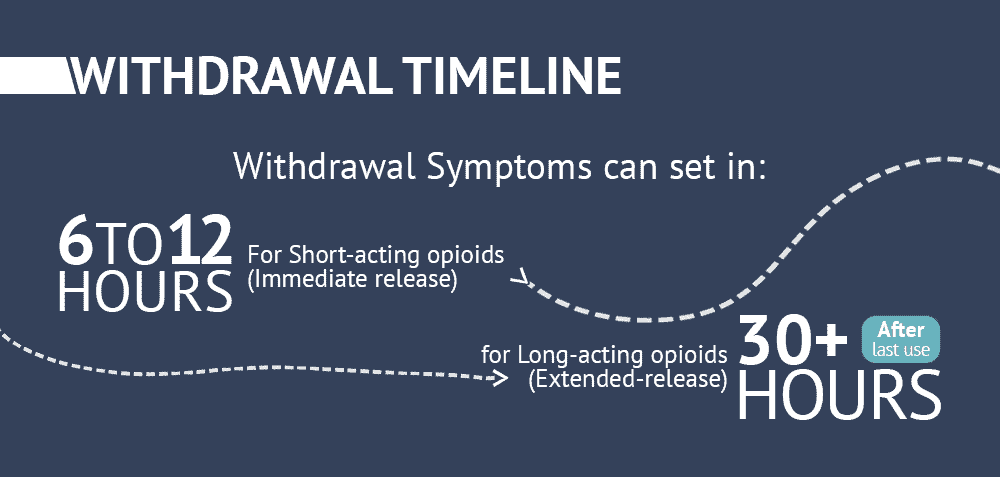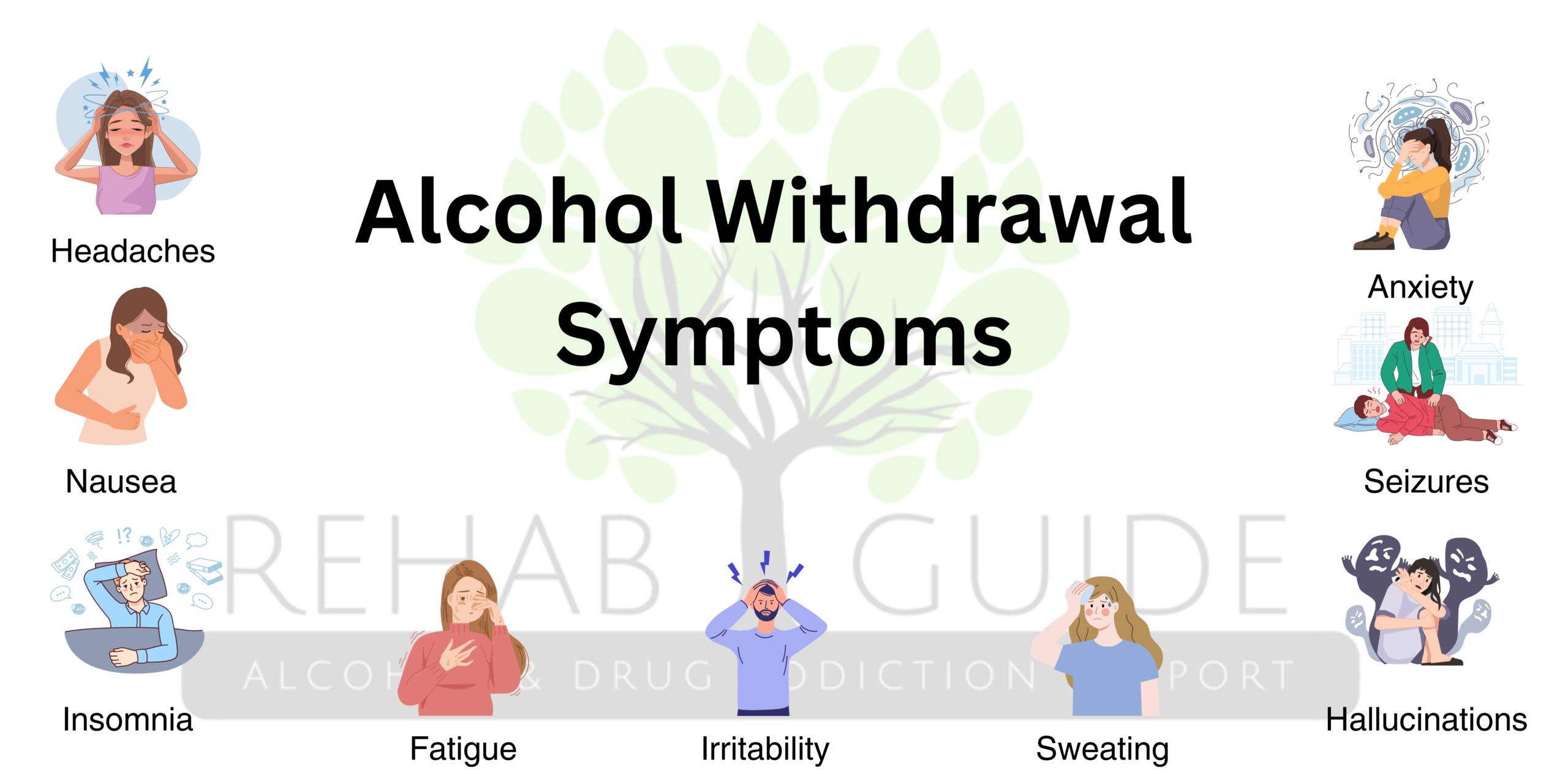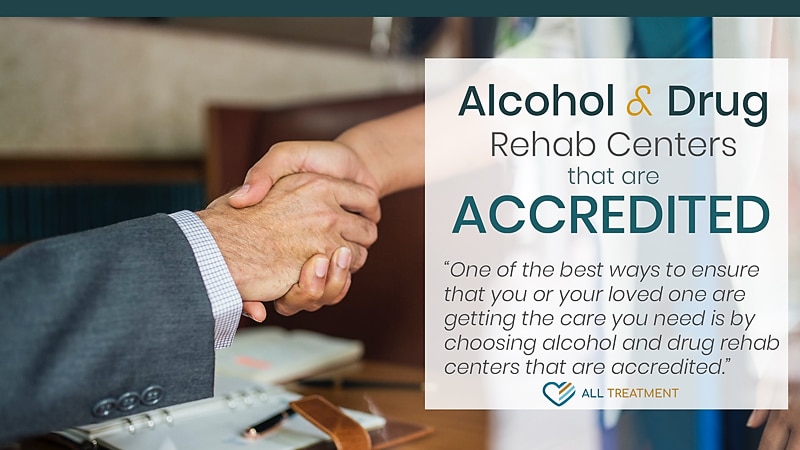
Why Choosing an Accredited Rehab Center Can Make All the Difference
Accredited rehab centers are facilities that have undergone rigorous evaluation by independent organizations to verify they meet high standards for patient safety, quality care, and evidence-based treatment. When you’re searching for addiction treatment, this accreditation serves as a critical quality marker to help you identify legitimate, trustworthy programs.
What You Need to Know About Accredited Rehab Centers:
- Accreditation means external verification – Independent organizations like CARF and The Joint Commission conduct thorough on-site surveys to ensure facilities exceed basic state licensing requirements
- Higher standards of care – Only 34.4% of mental health facilities meet The Joint Commission’s standards, and just 24% meet CARF’s accreditation standards, compared to 70% that meet basic state licensure
- Better treatment outcomes – Organizations see a 26% increase in clients served and 37% increase in compliance with quality standards after their first accreditation survey
- Insurance coverage – Most insurance companies require accreditation for reimbursement, making it essential for affordable care
- Not a recovery guarantee – While accreditation ensures quality standards, individual recovery success depends on multiple factors including patient engagement
The search for addiction treatment can be overwhelming, with countless online ads making bold promises. Accreditation cuts through this confusion. It’s an objective seal of quality, signifying a facility has been vetted by experts and is committed to the highest standards.
State licensing is the bare minimum—it just means a facility can legally operate. Accreditation goes much further, examining everything from staff qualifications and treatment methods to emergency plans and ongoing quality improvement efforts.
At Addiction Helpline America, we help individuals and families steer the complexities of addiction treatment. We connect you with accredited rehab centers that provide safe, effective care, guiding you to facilities that have been independently verified to meet rigorous quality standards.
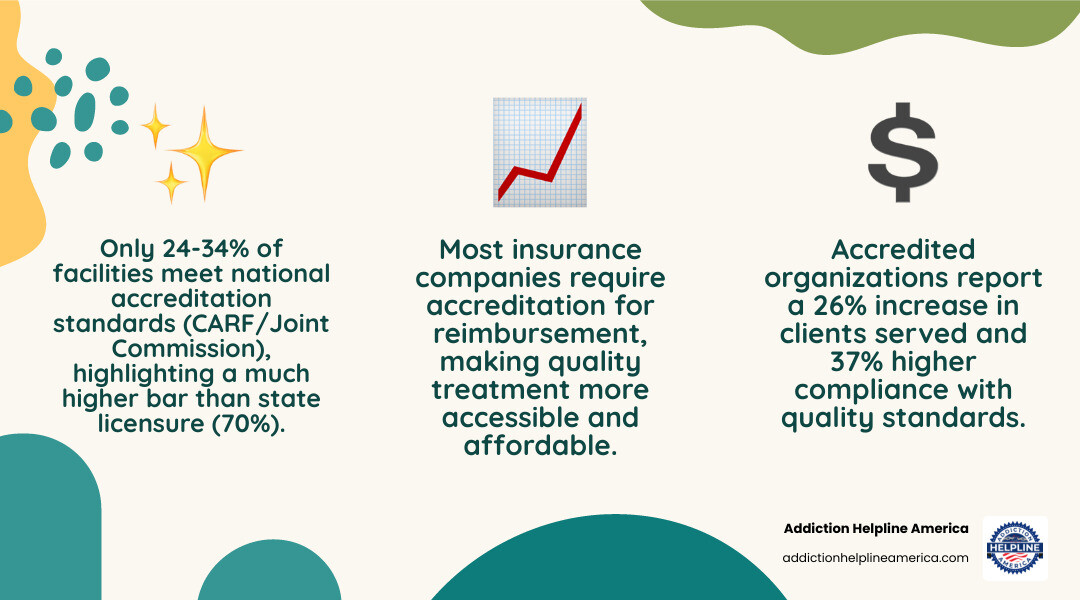
Basic accredited rehab centers glossary:
- comprehensive rehab programs
- how much do drug rehab centers cost
- what drug rehab centers accept medicaid
What is Accreditation and Why Does It Matter?
Understanding the difference between state licensure and accreditation is crucial when seeking addiction treatment, as it directly impacts the quality of care.
State licensure is the minimum legal requirement for a facility to operate. It covers basic safety, staffing, and treatment protocols. In contrast, accreditation is a voluntary process where a facility invites independent experts for a rigorous evaluation. It shows a commitment to exceeding minimum standards and achieving excellence in care.
These independent organizations examine a facility’s operations, from staff training and emergency plans to the use of evidence-based treatment methods. Accredited rehab centers voluntarily undergo this scrutiny to prove their commitment to providing the best possible care. For patients and families, accreditation provides a trustworthy guide during a vulnerable time. It confirms that a program prioritizes safety, employs qualified professionals, and uses proven treatment approaches.
The statistics are telling: while about 70% of mental health facilities meet basic state licensure requirements, far fewer achieve the highest national accreditation. Only 34.4% of facilities meet The Joint Commission’s standards, and just 24% meet CARF’s accreditation standards.
This gap signifies that accredited facilities are held to a much higher standard. In fact, organizations completing CARF accreditation report a 26% increase in clients served and a 37% increase in compliance with quality industry standards, translating to better care and outcomes for patients. For facilities, accreditation drives continuous improvement, pushing them to refine programs and stay current with best practices. This commitment directly benefits patients.
Accreditation is your assurance that a facility has been thoroughly vetted for quality. While state licensure says a center can operate, accreditation says it’s committed to excellence. At Addiction Helpline America, we prioritize connecting you with these high-quality facilities, because you deserve more than the minimum standard of care.
Understanding Accreditation in Addiction Treatment
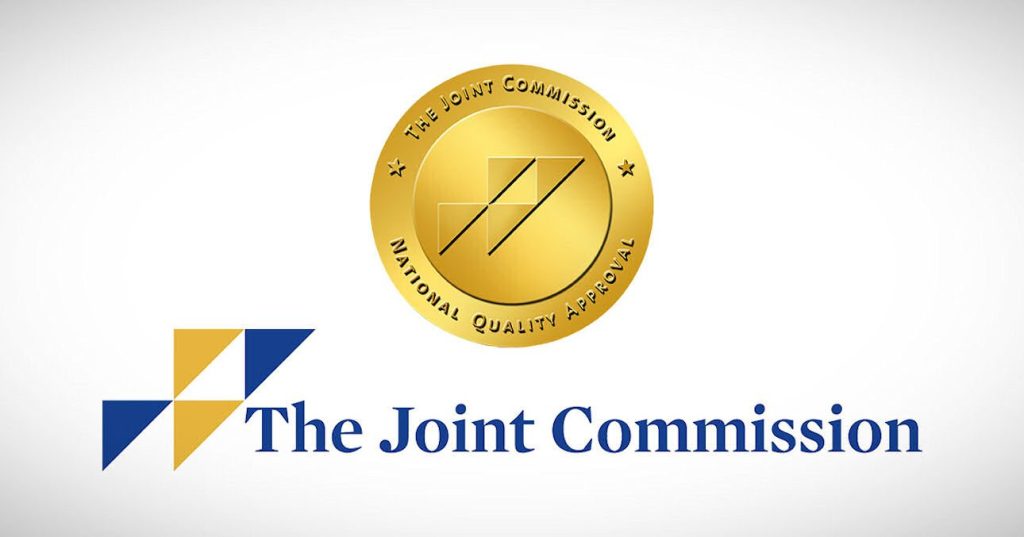
Understanding how accreditation works can give you confidence in your choice. Accredited rehab centers earn their status from independent, expert organizations that set and uphold industry performance standards.
The process involves comprehensive on-site surveys where experts review everything from documentation to treatment practices. Crucially, accreditation isn’t a one-time event; facilities must renew it every one to three years, ensuring a continuous commitment to excellence.
What Makes a Rehab Center Accredited?
Becoming an accredited rehab center requires a significant commitment to patient safety and quality care. The “Gold Seal of Approval,” particularly associated with The Joint Commission, is a widely recognized symbol of quality, showing an organization has voluntarily met stringent standards.
The core of accreditation is the on-site survey. Surveyors examine policies and procedures, staff credentials, the use of evidence-based treatment modalities, treatment outcome data, and the physical environment to ensure it is safe and therapeutic. This intense scrutiny, which can take over a year to complete initially, demonstrates a facility’s deep commitment to quality, far beyond a simple “rubber stamp.”
Accreditation Models and Standards
The two main accrediting bodies in addiction treatment are the Commission on Accreditation of Rehabilitation Facilities (CARF) and The Joint Commission.
CARF uses a consultative, peer-review model, focusing heavily on person-centered care. It is the only entity approved by the American Society of Addiction Medicine (ASAM) to certify residential substance use disorder treatment services. CARF-accredited programs serve more than 15.3 million people annually. Learn more at CARF’s official website.
The Joint Commission accredits a wide range of healthcare organizations, including hospitals, and has robust standards for behavioral health. Its “Gold Seal of Approval” is widely recognized by insurers and healthcare professionals. Find more information at The Joint Commission’s website.
Both organizations require continuous adherence to standards, with regular re-evaluation and on-site surveys every one to three years.
Key Differences and Other Important Certifications
While both CARF and The Joint Commission are gold standards, there are key differences. CARF specializes in rehabilitation and substance use disorders with a collaborative, peer-review approach. The Joint Commission brings a broader healthcare perspective with a more regulatory approach and its widely recognized “Gold Seal of Approval.”
Other certifications also signal quality. A HIPAA Seal of Compliance shows a commitment to privacy. LegitScript certification is required by platforms like Google and Facebook, ensuring ethical advertising standards. Additionally, listing in the SAMHSA Behavioral Health Treatment Services Locator indicates a facility meets federal and state requirements.
At Addiction Helpline America, we help you understand what these credentials mean and connect you with facilities that have earned them through a genuine commitment to quality care.
The Benefits of Choosing Accredited Rehab Centers

Choosing an accredited rehab center means selecting a program proven to be committed to excellence. This commitment translates into tangible benefits, including higher quality care, better insurance coverage, and peace of mind.
Higher Standards for Patient Safety and Care
Accredited rehab centers are committed to continuous improvement, regularly updating their practices based on the latest addiction medicine research. This is most evident in their use of evidence-based practices. Instead of unproven methods, accredited facilities use scientifically validated approaches like Cognitive Behavioral Therapy, Motivational Interviewing, and Medication-Assisted Treatment (when appropriate), which significantly improve recovery outcomes, as outlined in the National Institute on Drug Abuse’s Principles of Effective Treatment.
Accreditation standards also require cultural competence. This ensures treatment plans are customized to your unique circumstances, whether that involves co-occurring mental health conditions, cultural traditions, or the specific challenges faced by veterans or LGBTQ+ individuals. The goal is a safe, therapeutic environment where you feel understood and your individual journey is honored.
Impact on Insurance and Financial Peace of Mind
Accreditation is critical for your finances. Most insurance companies, including Medicare and Medicaid, require facilities to hold recognized accreditation before they will approve coverage. Insurers use accreditation to verify quality.
Choosing an accredited rehab center dramatically improves your chances of being covered. When a facility is accredited by CARF or The Joint Commission, insurers see it as a reliable indicator of effective care. This reduces financial stress, as accreditation is often a prerequisite for a facility to be “in-network” with an insurance provider.
The peace of mind from insurance coverage is a significant benefit, removing a major barrier to treatment. Always verify your specific coverage, but know that accreditation is your strongest ally in securing it.
Does Accreditation Guarantee Successful Recovery?
It’s important to be honest: choosing an accredited rehab center does not guarantee successful recovery. No facility can truthfully promise that. Success depends on many personal factors, including your engagement in treatment, the severity of the addiction, co-occurring conditions, and your post-treatment support system.
However, accreditation does guarantee you are entering a program that adheres to the highest industry standards. An accredited rehab center is committed to using evidence-based practices, employing qualified staff, and maintaining a safe, ethical environment. It has been independently verified to meet quality benchmarks far exceeding basic state licensing.
Accreditation provides the strongest possible foundation for recovery. It ensures you have access to the best tools and professional support, significantly increasing your chances of success by avoiding the risks of substandard care.
How to Find and Verify Accredited Rehab Centers
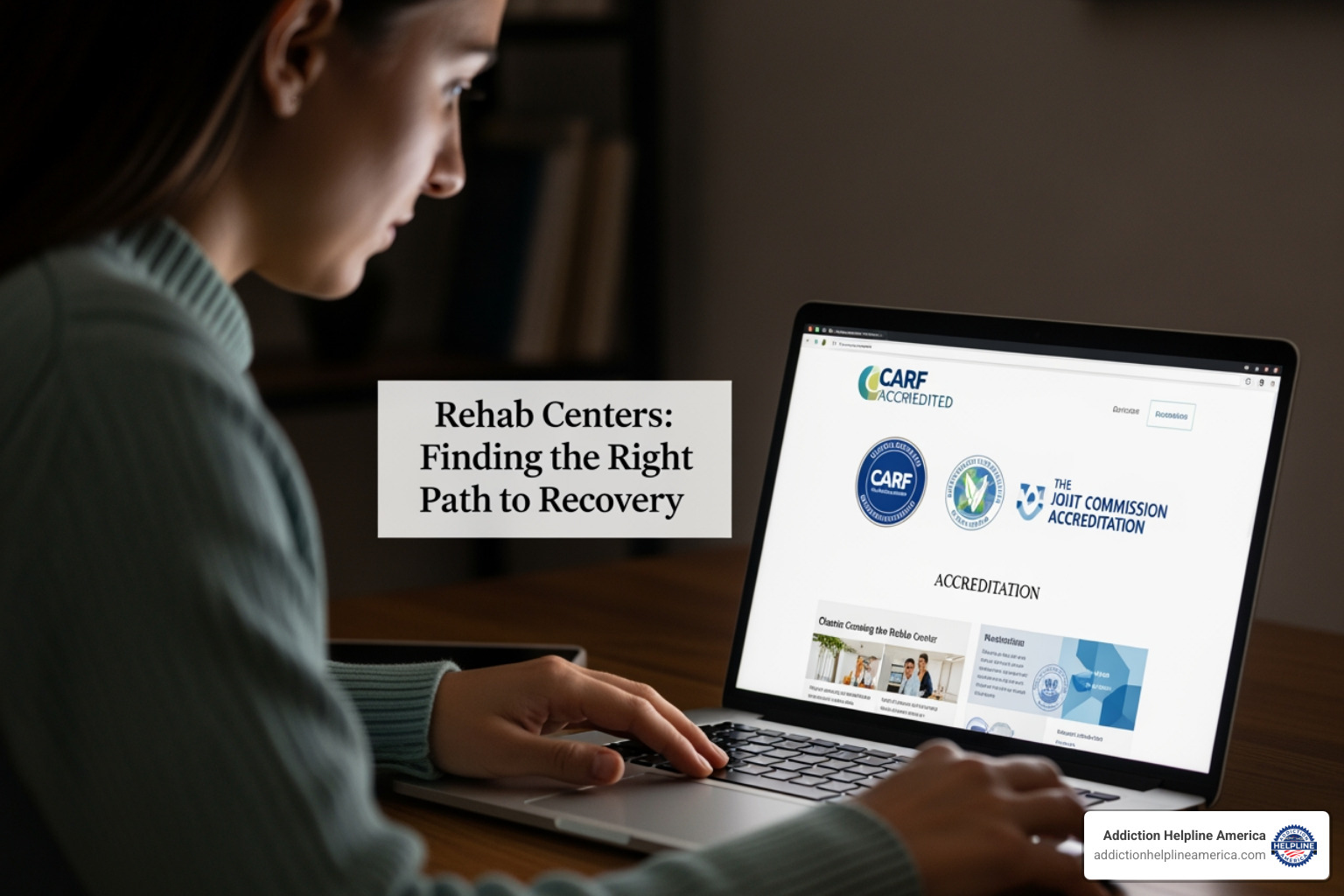
Now that you know why accreditation is important, here’s how to find and verify accredited rehab centers. Start by looking for accreditation seals from CARF or The Joint Commission on a facility’s website. These seals are a strong initial indicator of a quality program.
Always verify this information. When you contact a facility, ask about their accreditation status. A legitimate center will answer openly. Hesitation or vague answers should be considered a red flag.
Using Official Directories to Find Accredited Rehab Centers
To simplify your search, the Addiction Helpline America Treatment Locator connects you directly with vetted, quality programs. Our locator helps you find accredited rehab centers by filtering for location and specific services, such as inpatient or outpatient care.
We’ve already done much of the vetting for you. The facilities in our network are selected for meeting rigorous quality standards, including recognized accreditations, giving you a strong starting point. If you need personalized guidance, our confidential helpline is available for free. Our team can help you talk through your options and find the right program.
You can also verify a facility’s status directly on the official websites of CARF International and The Joint Commission, which both offer search tools.
Questions to Ask a Potential Rehab Center
Once you have a shortlist of accredited rehab centers, ask these key questions to determine the best fit:
- Is your facility accredited, and by which organization? They should immediately name CARF, The Joint Commission, or both.
- When was your last accreditation survey? A recent successful survey shows they are actively maintaining standards.
- Can you provide your accreditation report or a summary? A transparent facility should be willing to share relevant information.
- What are your staff’s qualifications? Inquire about licensing, credentials, and ongoing training in evidence-based practices.
- What are your safety protocols? Ask about patient safety, emergency procedures, and medication management.
- How do you support diverse populations? Ask how they serve individuals with unique needs, such as co-occurring disorders or specific cultural backgrounds.
- What aftercare support do you provide? Recovery continues after treatment, so comprehensive aftercare planning is essential.
A reputable facility will welcome your questions. If they seem dismissive, it may reflect how they treat patients. At Addiction Helpline America, we’re here to support you through every step of this process.
Frequently Asked Questions about Accredited Rehab Centers
Here are answers to common questions about accredited rehab centers to help you make an informed decision.
What are the implications of a rehab center not being accredited?
Choosing a non-accredited rehab center comes with significant risks:
- Lack of Independent Oversight: No third party is verifying that the facility maintains high standards.
- Outdated or Ineffective Care: The facility may not use evidence-based treatment practices that are scientifically proven to work.
- Patient Safety Risks: Protocols for medication management, infection control, and staff qualifications may not meet rigorous standards.
- No Insurance Coverage: Most insurance companies will not cover treatment at non-accredited facilities, leading to high out-of-pocket costs.
While most centers meet basic state licensing, only about 34% meet The Joint Commission’s standards and just 24% meet CARF’s standards, showing that accreditation signifies a much higher tier of care.
How much does accreditation cost a facility?
The main reason some facilities don’t pursue accreditation is the significant investment of time and money required. Becoming an accredited rehab center involves application fees, annual fees, survey fees, and often the cost of hiring consultants. It also demands a huge investment of staff time for training and procedural overhauls.
The process can take over a year of intense preparation before the on-site survey. This commitment demonstrates a facility’s deep dedication to quality care. Accreditation is not a “rubber stamp”; it signifies a willingness to be held accountable for providing excellent service.
How often do rehab centers need to renew their accreditation?
Accreditation is an ongoing commitment, not a one-time achievement. Accredited rehab centers must renew their status through regular re-evaluation. The Joint Commission typically conducts on-site surveys every three years, while CARF requires them every one to three years.
This renewal cycle ensures that facilities must maintain high standards continuously, not just for a single inspection. It creates a culture of ongoing excellence. For patients, this means you can trust that an accredited rehab center is committed to upholding its quality standards every day.
Take the Next Step Towards Quality Recovery
You now know that accredited rehab centers represent a higher standard of quality, safety, and evidence-based care. While not a guarantee of individual success, accreditation ensures a facility is committed to excellence and is held accountable through rigorous, regular evaluations.
The most important part is taking action. Choosing a treatment center is a major decision, but you don’t have to do it alone. Accreditation provides a clear roadmap to identifying trustworthy facilities.
At Addiction Helpline America, our mission is to simplify your search. We offer free, confidential, and personalized guidance to help you connect with vetted, accredited rehab centers that match your unique needs.
Our network spans the entire country, serving individuals and families in Alabama, Alaska, Arizona, Arkansas, California, Colorado, Connecticut, Delaware, Florida, Georgia, Hawaii, Idaho, Illinois, Indiana, Iowa, Kansas, Kentucky, Louisiana, Maine, Maryland, Massachusetts, Michigan, Minnesota, Mississippi, Missouri, Montana, Nebraska, Nevada, New Hampshire, New Jersey, New Mexico, New York, North Carolina, North Dakota, Ohio, Oklahoma, Oregon, Pennsylvania, Rhode Island, South Carolina, South Dakota, Tennessee, Texas, Utah, Vermont, Virginia, Washington, West Virginia, Wisconsin, Wyoming, and the District of Columbia. No matter where you are, we can help you find a program that meets rigorous standards.
Recovery is possible, and it begins with an informed choice. Let us help you turn your knowledge into action. Your healing journey deserves to start in a facility proven to prioritize your safety, dignity, and long-term success.
Find the right substance abuse treatment program for you
Reach out today. Let’s find the right path forward, together.
Our helpline is 100%
free & confidential
If you or someone you care about is struggling with drug or alcohol addiction, we can help you explore your recovery options. Don’t face this challenge alone—seek support from us.
Programs
Resources
Will my insurance
cover addiction
treatment?
We're ready to help
Find the best
drug or alcohol treatment
center
Are you or a loved one struggling with addiction? Call today to speak to a treatment expert.


